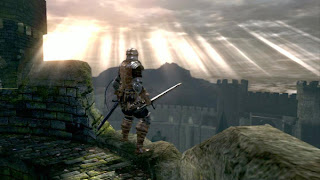Yager's Spec Ops: The Line would not have even been a blip on my radar had it not been for significant press about the game's story. Military shooters like SOCOM, Ghost Recon, or Call of Duty never hold my interests. I recognize the near flawless controls of Call of Duty, but I'll likely not purchase another one because I cannot get into the multiplayer. On the surface, Spec Ops is one of these games, and it stays this way just long enough for the player to realize this, pitting the player, who controls a more macho Nathan Drake, against non-white enemies alongside trash-talking grunts in some desert wasteland. At some point in the game, though, things go from status quo to FUBAR--I just can't pinpoint the exact moment.
The game's initial concept is simple, if not a bit stupid. Dubai has been hit by a sandstorm of biblical proportion, and the 33rd Battalion, led by John Konrad, tries to help evacuate those left behind, eventually staying behind after the U.S. asked them to come back. The United Arab Emirates declare Dubai a lost disaster zone until a transmission from Konrad breaks the radio stormwall, prompting the U.S. to send a Delta Force reconnaissance team into Dubai. At first, I questioned the plausibility of radio silence in the year 2012 when the game starts off as a standard military shooter in a hyperreal environment, but what begins as routine jingoistic, macho-military combat erodes into existential battles against former American soldiers. About midway through the game, I realized that "reality" (or some Baudrillardian "hyperreality") had broken down down, buried under piles of corpses and sand. Spec Ops never strives for realism that Call of Duty or Splinter Cell or numerous others attempt; instead it offers a surreality, a parallel military narrative that uses the tropes of other games in the genre only to undo them. The shifting sands, the hallucinations, and the psychedelic rock music all build an atmosphere on "unreality" in a genre that seems so focused on realism. To say much more would venture into spoiler territory--though shame on you if you've never read Heart of Darkness or seen Apocalypse Now.
As with all games, though, the narrative's effectiveness leans heavily on the actual gameplay. Here, I found the game's mechanics to be somewhere between adequate and good. Gears of War and Max Payne 3 offer more competent cover mechanicsthan Spec Ops does, but I cannot help wondering if Spec Ops' simple controls are by design. Just as Conrad parodied the adventure novel and Coppola parodied the epic war film, the team at Yager Development may be lampooning the controls of the third-person cover shooter--with the addition of elementary squad commands. If so, it works. In fact, the enemy AI is far too good for the cover mechanics to offer any sort of unreliability. The gameplay is nothing revelatory, but it crashes so beautifully with the narrative that I can't help asking myself, "Why the hell am I playing this game?" I know nothing good will happen at the end, but I want to see where it all is going. To do that, I have to put myself through what feels like mediocre gameplay but opens up as I realize its importance. Each explosion carries meaning as you tear apart a city that once stood for excessive decadence and architectural beauty. The ruinous Dubai setting is perfect for a game hell-bent on dealing with the very idea of mindless destruction and its repercussions.
And while the city crumbles, so too does your platoon of Not Nathan Drake and his two Not Nathan Drake's Buddies. While they start out with quippy banter and stupid machismo, their bonds are stretched and eventually snapped. While I've harped on Nolan North's over-exposure in the game industry, he delivers a stellar performance as Capt. Walker. The overall voice work is excellent, and it evolves too, in-game. Walker's reaction to suppressing enemy fire changes from an initial call for cover to a growling, "Fuck you," delivered toward the approaching enemy. A lot of times, I found myself uttering the same thing in tense firefights, resulting in looks from wife that fell somewhere concern and annoyance. It was a bit more sobering than I thought it would be.
I've made it fairly obvious here that I've a fascination with video game violence. I've discussed it's purpose in God of War and Red Dead Redemption, but rarely does a game so blatantly turn that violence outward, so much to tell the player, "You know you're a bit messed up for playing this, right?" It's a big question and one that needs asking. While I can't say I enjoyed the game without admitting my own appreciation of the macabre, I can recommend it, and I can do so highly. It warrants your attention if only to give you an abyss to stare into to see what looks back. In Apocalypse Now, Colonel Kurtz posits in what is likely the most chilling monologue in cinema history, "Horror and moral terror are your friends. If they are not, then they are enemies to be feared. They are truly enemies." Perhaps this game will make a worthy introduction to both of them.
Cheers,
--David














